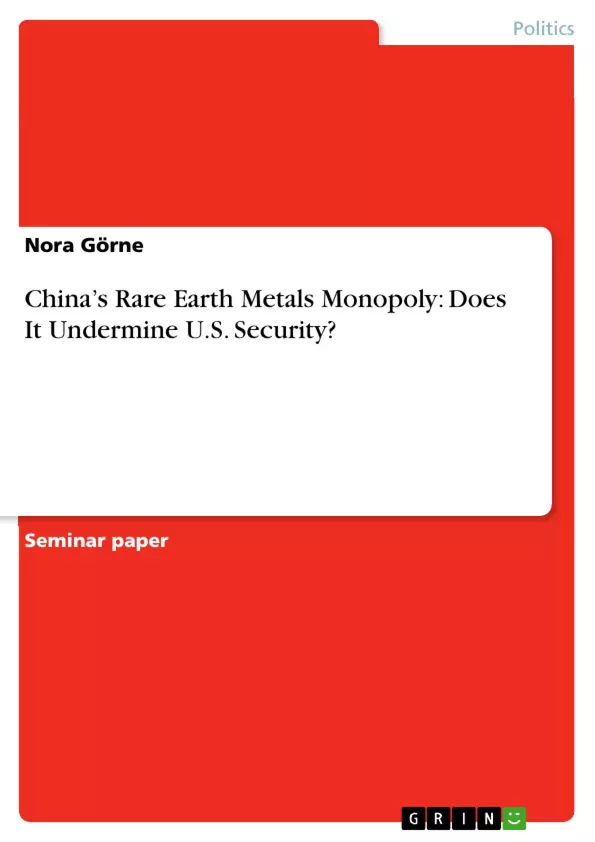Rare earth metals are chemical elements which are widely unknown to the general public but nevertheless can be found in everyday life. They are critical components of digital cameras, rechargeable batteries and magnets, of surgical lasers, polishing powders and military tanks. Even though their name suggests differently, they are not specifically rare but they often only exist in small deposits scattered over the globe which makes mining often fairly unprofitable. From 1986 onwards China established itself as the biggest producer of rare earth metals with by 2010 supplying 97% of world demand (Humphries, 2011, p. 13). In the past five years prices have been seen to increase tremendously and during the Senkaku boat collision incident, China imposed a trade embargo for rare earth metals against its opponent Japan. The question is to what extent China is going to use its dominant position in the future, specifically in regard to one of the biggest rare earth metal consumer, the United States. In the following the question whether China’s monopoly is indeed a serious threat to U.S. security will be answered. Therefore, first a detailed definition of rare earth metals and their applications and a historical overview will be given. Thereupon, it will be shown that China’s monopoly is indeed a security issue by a review of the relevant body of security literature, specifically the Copenhagen school approach. Afterwards the possible solutions will be examined.
Inhaltsverzeichnis (Table of Contents)
- What are Rare Earth Elements?
- China's Monopoly
- Security Risks and Potential Solutions
Zielsetzung und Themenschwerpunkte (Objectives and Key Themes)
This paper examines whether China's monopoly on rare earth metals (REM) poses a significant threat to U.S. security. The paper analyzes the historical development of China's dominance in the REM market and explores the implications of this control for the U.S. economy, military, and technological advancements.
- The importance of REMs in modern technologies and industries
- China's dominance in the REM market and its historical evolution
- The potential security risks associated with China's monopoly on REMs for the U.S.
- Possible solutions to mitigate these risks
- The impact of China's REM monopoly on global trade and relations
Zusammenfassung der Kapitel (Chapter Summaries)
The first section delves into the definition and applications of REMs, highlighting their crucial role in various industries, including information technology, green technologies, and military applications. The section also discusses the environmental concerns associated with REM extraction and the criticality of specific REM elements. The second section focuses on China's monopoly in the REM market, providing a historical overview of its rise to dominance and the reasons behind the closure of the Mountain Pass mine in the United States.
Schlüsselwörter (Keywords)
Rare earth metals, China, U.S. security, monopoly, trade embargo, security risks, environmental concerns, strategic minerals, technological advancements, global supply chains.
Frequently Asked Questions
Why does China have a monopoly on Rare Earth Metals (REM)?
Since 1986, China has strategically established itself as the top producer, supplying 97% of global demand by 2010. This was achieved through low production costs and less stringent environmental regulations compared to Western countries.
Are Rare Earth Metals actually rare?
No, they are relatively abundant in the earth's crust, but they are rarely found in high enough concentrations to make mining economically profitable, except in a few locations like China.
How does China's monopoly threaten U.S. security?
REMs are critical for military technology (tanks, lasers) and high-tech industries. A trade embargo or supply disruption, as seen during the 2010 incident with Japan, could cripple U.S. defense and economic infrastructure.
What is the "Copenhagen School" approach mentioned in the paper?
The Copenhagen School approach is used to analyze how economic issues like resource scarcity are "securitized," or framed as existential threats to national security to justify emergency measures.
What are potential solutions for the U.S. to mitigate this dependency?
Solutions include reopening domestic mines like Mountain Pass, investing in recycling REMs, finding synthetic alternatives, and diversifying global supply chains beyond China.
- Quote paper
- Nora Görne (Author), 2012, China’s Rare Earth Metals Monopoly: Does It Undermine U.S. Security?, Munich, GRIN Verlag, https://www.grin.com/document/195488



